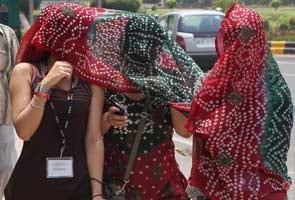
New Delhi:
Forced to live in relief camps on sidewalks due to the swollen Yamuna river, thousands of residents of Delhi's low-lying areas are facing a double whammy as they reel under intense heat, threatened by the possibility of an epidemic when the water recedes.
Nearly 10,000 people have been evacuated from low-lying areas like Usmanpur, Yamuna Bazar, Bhajanpura, Shastri Park and Tibetan Market, and shifted to over 1,100 relief camps set up by the city government. The evacuation began on Monday.
"The weather was fine earlier, but in the last few days, the mercury has been rising constantly. The heat is starting to become unbearable," said Om Dutt, who was evacuated from under a flyover to a tent made of a thin canvas sheet near Mayur Vihar in east Delhi. The maximum temperature in Delhi rose to 41 degrees today.
"We have no choice but to sleep under flyovers," added Mr Dutt, who works as a security guard in a private school in east Delhi.
Many low-lying areas in east and northern Delhi have been inundated by the Yamuna river, which touched the 207.25 metre mark late Wednesday, the highest since 1978 when it reached 207.49 metres. The level receded to 204.63 this morning, below the danger mark of 204.83.
Over 900,000 cusecs of water was released into the Yamuna from Hathinikund Barrage in Haryana, resulting in the river's water level rising.
The 145-year-old double decker rail-cum-road bridge over the Yamuna in Shatri Park in east Delhi was shut down for traffic for two days due to fears of damage by the river's strong current. The bridge was re-opened yesterday.
With the water receding, localities like Tibetan Colony near Majnu Ka Tila in northeast Delhi have seen restoration of power and drinking water.
"Most of the water has dried up and electricity and water has been restored in almost all houses. People have started moving back to their houses," Ngodupchophl, vice president of the Residents' Welfare Association of the colony, told IANS.
As the water level drops, it has left behind stench, flies, mosquitoes and insects, which residents feel will result in the breakout of waterborne diseases like typhoid, cholera etc.
"We are afraid that we could fall ill as the water dries up," said Kakuli Devi, who lives in Yamuna Pushta.
However, the Delhi government had said Thursday that relief camps are being sprayed with anti-malaria medicines daily and families are being provided with chlorine to keep drinking water safe.
"Anti-malaria spray is being given to people in the camps and fumigation against mosquitoes is being done daily. Chlorine bottles are being provided to families to store drinking water," said a Delhi government official.
Meanwhile, more people were evacuated last evening from many areas along the river as a precautionary measure.
People from the city's south, central and the north districts were evacuated last night by authorities, who fear that these areas are prone to flooding if the city receives more rain in coming days.
Nearly 10,000 people have been evacuated from low-lying areas like Usmanpur, Yamuna Bazar, Bhajanpura, Shastri Park and Tibetan Market, and shifted to over 1,100 relief camps set up by the city government. The evacuation began on Monday.
"The weather was fine earlier, but in the last few days, the mercury has been rising constantly. The heat is starting to become unbearable," said Om Dutt, who was evacuated from under a flyover to a tent made of a thin canvas sheet near Mayur Vihar in east Delhi. The maximum temperature in Delhi rose to 41 degrees today.
"We have no choice but to sleep under flyovers," added Mr Dutt, who works as a security guard in a private school in east Delhi.
Many low-lying areas in east and northern Delhi have been inundated by the Yamuna river, which touched the 207.25 metre mark late Wednesday, the highest since 1978 when it reached 207.49 metres. The level receded to 204.63 this morning, below the danger mark of 204.83.
Over 900,000 cusecs of water was released into the Yamuna from Hathinikund Barrage in Haryana, resulting in the river's water level rising.
The 145-year-old double decker rail-cum-road bridge over the Yamuna in Shatri Park in east Delhi was shut down for traffic for two days due to fears of damage by the river's strong current. The bridge was re-opened yesterday.
With the water receding, localities like Tibetan Colony near Majnu Ka Tila in northeast Delhi have seen restoration of power and drinking water.
"Most of the water has dried up and electricity and water has been restored in almost all houses. People have started moving back to their houses," Ngodupchophl, vice president of the Residents' Welfare Association of the colony, told IANS.
As the water level drops, it has left behind stench, flies, mosquitoes and insects, which residents feel will result in the breakout of waterborne diseases like typhoid, cholera etc.
"We are afraid that we could fall ill as the water dries up," said Kakuli Devi, who lives in Yamuna Pushta.
However, the Delhi government had said Thursday that relief camps are being sprayed with anti-malaria medicines daily and families are being provided with chlorine to keep drinking water safe.
"Anti-malaria spray is being given to people in the camps and fumigation against mosquitoes is being done daily. Chlorine bottles are being provided to families to store drinking water," said a Delhi government official.
Meanwhile, more people were evacuated last evening from many areas along the river as a precautionary measure.
People from the city's south, central and the north districts were evacuated last night by authorities, who fear that these areas are prone to flooding if the city receives more rain in coming days.
Track Latest News Live on NDTV.com and get news updates from India and around the world

